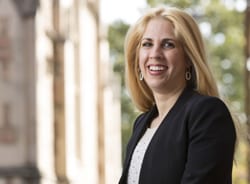By Neil Schoenherr
Tax-time savings programs help low- and moderate-income families save significantly more of their refunds than those who choose not to participate, finds an analysis of such a program called $aveNYC. 
“Our findings suggest that the overall effect of $aveNYC was positive and significant, demonstrating the potential of tax refunds to generate sustained savings that help households to be better off,” said study co-author Michal Grinstein-Weiss, PhD, associate professor at the Brown School at Washington University in St. Louis and associate director of the Center for Social Development (CSD).
Grinstein-Weiss is a leading national expert and researcher in the field of household financial security and asset building.
The study, Tax-Time Savings Among Low-Income Households in the $aveNYC Program, was published in March in The Journal of Consumer Affairs.
The study analyzed data from the 2008-10 tax seasons for $aveNYC, a New York City program that offered tax filers at selected Volunteer Income Tax Assistance sites the opportunity to open a savings account with their refund. If the participants left their savings in the account for one year, the program matched the funds. The savings generated were intended to help households manage unexpected expenses and become more economically secure.
“Short-term general savings, like those enabled by the tax refund windfall and incentivized by $aveNYC, may put families in a better position to survive and thrive during difficult economic times,” Grinstein-Weiss said.
After addressing sample imbalance and outliers, Grinstein-Weiss and co-authors found that $aveNYC participation was associated with an increased likelihood that an individual would have savings — with the likelihood of having at least enough savings to cover one month’s expenses. On average, $aveNYC participation was associated with about $300 in additional savings compared with the non-$aveNYC participants.
“This is significant because these findings show the promise of tax-time savings at helping low-income households increase financial security,” Grinstein-Weiss said.
The study reports that 66 percent of program participants were able to maintain their savings for a year and receive the matching incentive.
“The high rate of successful savers shows that low-income households can save when given the right opportunities and incentives,” Grinstein-Weiss said.
Inspired in part by the successful outcomes of the $ave NYC program, Grinstein-Weiss, along with Dan Ariely, PhD, the James B. Duke Professor of Behavioral Economics at Duke University, partnered with Intuit Inc., the maker of TurboTax software, Quicken Books and Mint, to create the groundbreaking Refund to Savings Initiative.
Over the past five tax seasons, the Refund to Savings partners have begun to develop and integrate simple, behaviorally informed tax refund savings opportunities into tax filing software, giving millions of taxpayers the chance to save their refund. The initiative also incorporates rigorously designed research methodologies to compare interventions and to gather information on millions of low- and moderate-income tax payers.
Other authors on the $aveNYC study include Clinton Key, research manager at Pew Charitable Trusts; Jenna N. Tucker, enrollment research analyst with the University of Houston; and Krista Comer, who was at the time a project director at CSD.